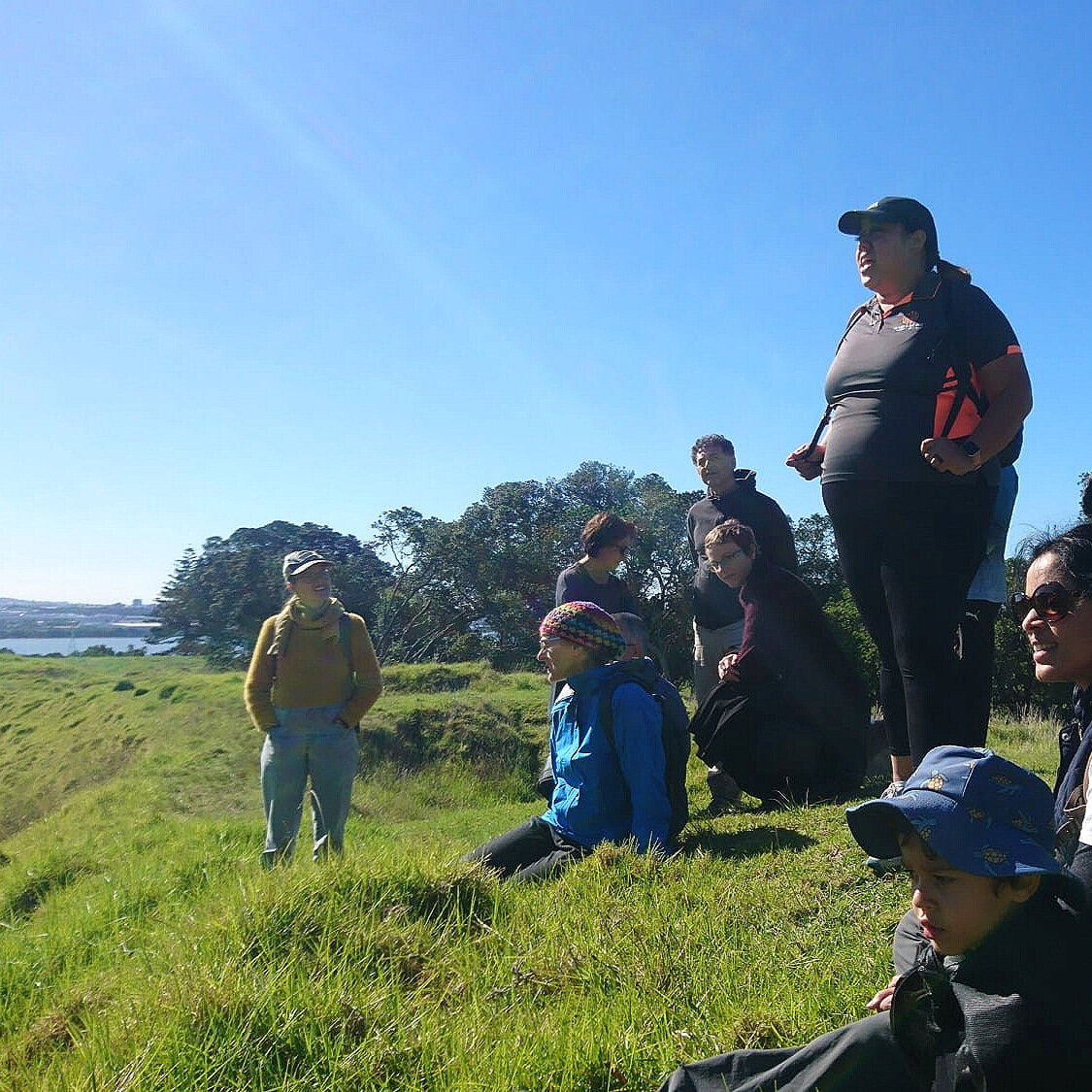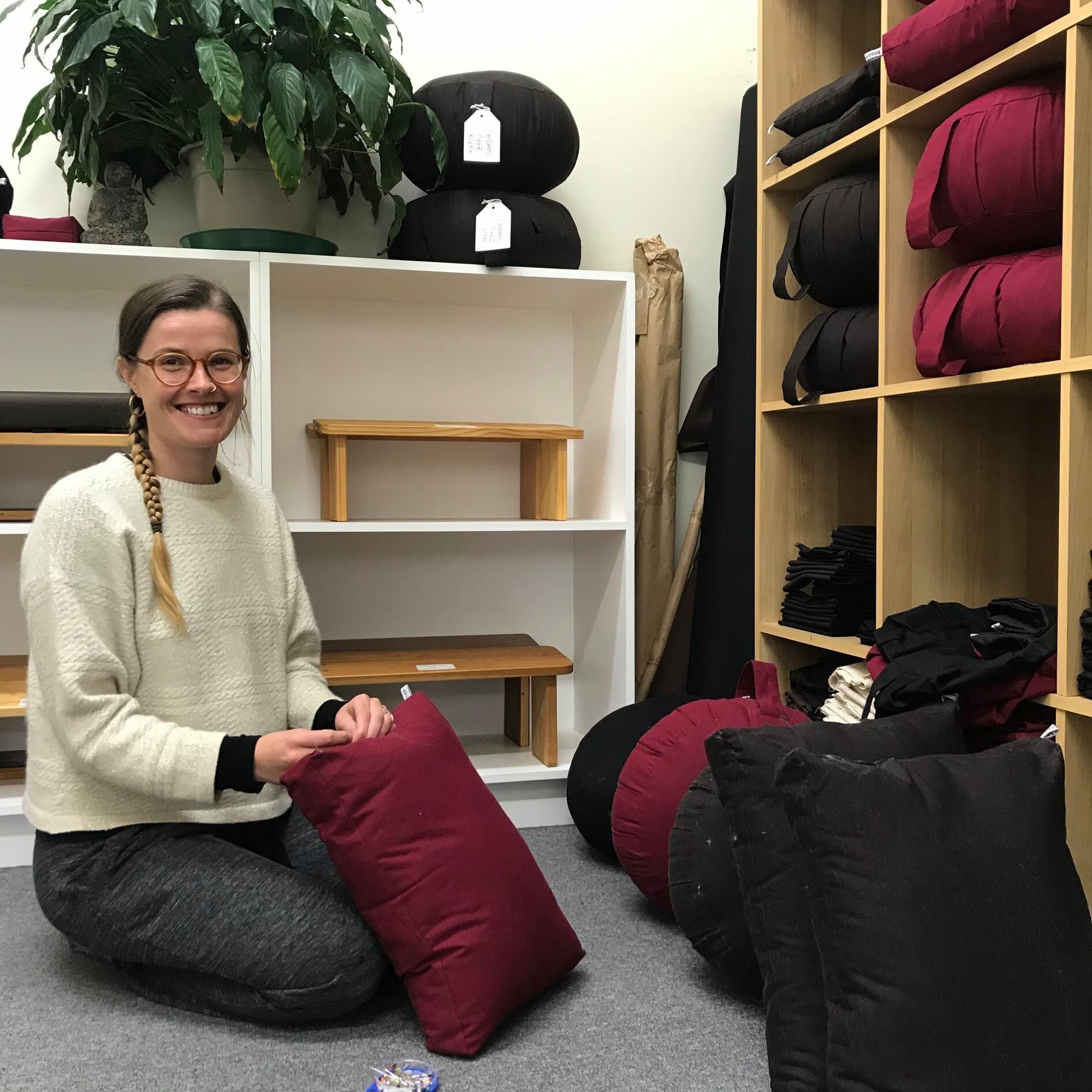AZC Newsletter June 2021
Amala-sensei on “Leave No Traces”
A couple of weeks ago I was asked to give a short talk at the New Zealand Buddhist Council AGM, along with two other Dharma teachers. We were posed this question: What skilful strategies from the Buddhist tradition are sometimes overlooked but could be used more widely to address the challenges of modern times? What immediately sprung to mind as a teaching to address the challenges of mass extinction and climate crisis was the Zen motto, "leave no traces."
In Zen training centres and temples we first meet this teaching in the zendo, where we are instructed to smooth and plump up our cushion at the end of a sitting, so they are ready for the next person. In sesshin formal meals we are encouraged to take only what we need and to eat all that we take, leaving our plate bare, and we chant that "our meal is the labour of countless beings", reminding ourselves that we are kept alive and healthy because of the labour of others. Our Ancestral Line chant reminds us of the precious gift of the Dharma we have received, like relay runners, from our Dharma forebears, and which we must hand on in good shape to the next generation. The ten precepts guide us in creating less "karmic residue" by thinking, speaking and acting in ways that don't cause harm. And our sitting cultivates a state of absorption in which nothing is left over, nothing left out, no trace of self remaining. "Leave no traces" is a both an invitation to care, to include in our present moment those who come before us and after us, and an expression of boundless Buddha Nature. There's a Zen story about this:
Two senior Zen students were refining their spiritual understanding by travelling throughout the country to train with respected teachers. They heard that there was a master living with a few disciples deep in the forest near the headwaters of a river. One morning, after weeks of travel, they were eagerly approaching the hermitage when they saw in the stream that flowed down the mountain, a cabbage leaf floating by. Disappointed, they immediately turned to leave, but as they did so they saw the old master, her sleeves flapping, running along the stream and scooping up the stray cabbage leaf. The two pilgrims smiled at each other and resumed their climb towards the monastery, sure now that they had come to the right place.
So "leave no traces" is about much more than frugality or gratitude or not wasting precious resources, though it encompasses all of these. It is an attitude of reverence and tender care towards all animate and inanimate things. It is a widely neglected practice in our consumer society, but it can be cultivated. Here's how nature writer Robert McFarlane puts it:
... to see ourselves as a web of gift, inheritance and legacy stretching over millions of years past and millions to come, bringing us to consider what we are leaving behind for the epoch and beings that will follow us.
Update on Zen Centre's 2019 Declaration of a Climate Emergency
Amala-sensei reflects:
Water dripping ceaselessly
will fill the four seas.
Specks of dust not wiped away
Will become the five mountains.
--Wang Ming 6th Century CE
Back in the middle of 2019, along with many other organisations, the Centre declared a climate emergency. Part of our declaration reads:
By declaring a Climate Emergency, we commit to:
incorporating climate crisis considerations into the life of our Centre, our decisions, practices, purchases and policies
advocating strongly for greater central government and city leadership and action on climate change
treasuring and deepening our practice, which enables us to find love, compassion, joy, equanimity, and the courage for action in the midst of uncertainty and change
Preparing a report for the Trustees reviewing the past couple of years of climate action, we were heartened to see that we have in fact made substantial efforts in all three areas we mention. Of course these actions are but drops in a vast ocean -- but oceans are made of accumulating drops.
Under the first heading of incorporating the climate crisis into our decisions and practices, we have undertaken EKOS Carbon-Friendly certification, we've verified that our electricity supply is 100% renewable, and we have started to talk to other Onehunga faith communities about what we might do locally around this issue (see below under Hīkoi).
Our second commitment was advocating strongly for greater central and local government leadership on climate change. Robin and I have made submissions on 7 climate-related initiatives, including the massive He Pou a Rangi / Climate Change Commission Draft Advice.
Our third commitment was to deepen our Dharma practice in the context of the climate crisis. Besides our Earth Day ceremonies and all-day sittings, which happened even in 2020 during lockdown, I've continued to talk regularly about climate and other environmental issues.
Trust news
Survey
The Trustees undertook a survey of the Sangha last year, and the survey results are available on the Centre's governance page. Two of the issues which stood out were some dissatisfaction with our audio streaming service, Mixlr, and room for improvement of the website. We have now purchased a webcam for the zendo, and are in the process of getting the hardware to support it. Once the system is fully set up and tested, we will be able to start broadcasting selected ceremonies, and eventually our Tuesday night sittings, teishos and chanting services. Hanya has volunteered to host these when she returns to New Zealand after visiting her sister in California. We are also in the process of a major revamp of the website and are grateful for all the suggestions for improvements that we received via the survey.
2020-2021 Financial Report from the Treasurer
The Trustees are pleased to present a brief summary of the financial accounts for the 12 months from 1 April 2020 to 31 March 2021. When preparing the budget for the 2021 financial year there was a lot of uncertainty about the impact of Covid on the Sangha, as well as more generally on the New Zealand economy. They are happy to advise that the Centre ended the financial year with an unaudited surplus of $28,199, once again a result of strong Sangha support (by way of dana and purchases from Dharmagear). Costs were tightly managed, and also lowered by 110 days of Zendo closure resulting from lockdown. This is a good result and shows how important the support of all Sangha members are to the financial survival of the centre.
Revenue:
Revenue has shown a small increase of 1% over the same period last year, $140,463, versus $138,902 (2019-2020).
Expenses:
The modest increase in revenue was more than offset by a 14% drop in expenses from $125,871 to $108,507. Contributing to this reduction was the impact of Covid closures, deferred maintenance and a reduction in staff costs from the pervious year.
Surplus: (Before interest, depreciation and adjustments)
The Centre’s financials show a surplus of $27,187 in comparison to 2019, an increase of $20,247 over the same period last year
In summary:
Continuing strong support from Sangha members combined with reduced expenses resulted in a much improved result. The Trustees also recognise the outstanding efforts by Sensei and Robin throughout lockdown in reaching out to all via electronic media and in so doing sustaining our practice when really needed.
from Peter Christensen, Treasurer
Sangha news
Mangere Mountain Hīkoi
At the beginning of May a group of members from the Zen Centre, St. Peter's Anglican Church and Beth Shalom Progressive Jewish Synagogue participated in a hīkoi on Māngere Mountain (Te Pane o Mataoho), led by kaiārahi Elleshia Whaanga-Aiono (Te Wai o Hua) from the Māngere Mountain Education Centre, who introduced us to some of the history of the maunga.
Ellishia’s stories recreated the structures of the pā that once stood on the maunga, and gave us vivid glimpses of the village life: the harvesting and storing kumara crops, the gathering of kaimoana and food from the forests, the gatherings and rituals. Many of us came away with a stronger sense of connection to the maunga and the local hapū. The walk was a first step in getting together with other Onehunga faith groups to work on a local climate change response.
New staff member
Erena Shingade recently joined the Centre's staff, working two days a week. She is taking over bookkeeping duties from Robin and learning the ins and outs of Dharmagear. She writes: "Work has been a kōan for me over the years as I have tried to bring my Zen practice to open plan offices and fast-paced communications roles. After many lunchtimes spent sitting with pigeons or walking up and down stairwells, I am grateful for the opportunity to do samu in an environment that is supportive. Working in service of the Sangha is a blessing and I look forward to discovering how I can deepen my contribution."
Sangha in the south
Tony Carpinter and family have recently shifted from Auckland to Christchurch and we wish them well in their new southern lives.
Next year Robin and Kate are also shifting to Christchurch. They are returning to the beloved landscapes of mountains and rivers that they grew up with, and they are looking forward to living close to family again.
Footnote from Sensei:
With Robin's departure to Christchurch around the middle of 2022, the Trustees will be inviting people in the Sangha to apply for her position towards the end of the year, with a start date of around April (so there is overlap for training purposes). With Erena having already taken on parts of the job, the position will be 24 hours a week (at the minimum wage), and cover office administration, zendo support and Dharmagear. Excellent time-management skills, familiarity with Zen forms and a love of the Buddhadharma are essential. If you think you might be interested in the position, doing some volunteering at the Centre over the coming year would give you an idea of what to expect. Applications will open towards the end of 2021, but contact me if you are interested or have questions.
Celebrations
Vesak
On the morning of the Buddha's 2565th birthday, the Centre was decked out with brightly coloured flags, elephant decorations, and bunches of fresh flowers. Young and old enjoyed the ceremony and celebrations. This happy family celebration is a bright spot in our winter calendar, falling as it does in May as the nights are lengthening and the weather cooling.





